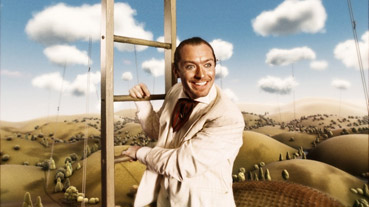"Parnassus is a transparent kind of self-portrait.
Man with imagination wants to share it with the
world, and the world doesn't want to listen. And
he is getting really old before our eyes." |
Director, Terry Gilliam |
If you enforced a media embargo on me (no news, no TV, no internet) for the last two years, you could wheel me into a screening of Doctor Parnassus and within minutes, I'd be smiling at instantly recognising a new movie from Terry Gilliam. This isn't my gift, it's Gilliam's. His signature isn't so much on his movie as his DNA is vigorously coursing through its sockets. This is personal cinema of the rarest kind. Personal to Gilliam is like several explosions of the ripest imaginations only the most gifted can muster. He's no 'wobblecam' dilettante but a structured dreamer with the tenacity of a multicoloured terrier, a trait all too necessary to get his vision on screen. Those with the most to show have to work harder to get their brain candy through the development hell that is film funding. Parnassus does not pander to its audience and assumes a certain native intelligence but despite this it comes with well publicised baggage. In an attempt to put the movie front and centre, let's breezily skate over the baggage with the merest of mentions.
Two thirds of the way through shooting Parnassus, star Heath Ledger died of an accidental overdose. He had been plagued by chronic insomnia. Gilliam secured friend and star Johnny Depp to play 'Tony' (subtle and judicious rewrites allowed physical metamorphoses inside the Imaginarium and in the movie it doesn't jar one bit) but Depp's schedule couldn't allow him to complete the role. Both Jude Law and Colin Farrell stepped in for the remaining two sessions inside the mirror. Gilliam's producer/daughter prodded the jinxed film-maker so much so that the film was completed to honour Ledger's memory and the contractual "A Terry Gilliam Film" is replaced lovingly by a caption at the end of the movie that simply reads "A Film By Heath Ledger And His Friends". The three replacement actors generously donated their salaries to Ledger's daughter, Matilda. This was an act of generosity that touched Gilliam's heart.

So what's the story? Doctor Parnassus is an elderly dreamer with a gift. He's played by a terrific Christopher Plummer, knocking on 80 but charming and convincing as an immortal with the world on his shoulders. In his portable sideshow that he opens in various locations in London, he has a magical mirror. Once you step through it, Parnassus' imagination transports you to a sort of personalised Elysium. Performing with him are daughter Valentina (Lily Cole) and actors Anton (Andrew Garfield) and Percy (Verne Troyer). Lily Cole is more well known as a model and it's easy to see why but she does have a slightly unnerving resemblance to the (presumably) CG altered Scottish actress advertising Playstation a few years ago. You look at her arresting face and just for fleeting seconds you feel it's the tiniest bit wider than most. Andrew Garfield's Anton is perhaps the most conventional of the four and it did seem inevitable that Austin Powers' Mini-Me, Verne Troyer, would eventually feature in a Terry Gilliam movie. He plays Plummer's conscience and I mean that metaphorically. This odd foursome eke out a meagre living performing to a disinterested public. Once a drunken lout stumbles into the mirror and experiences a form of penance for his coarse behaviour, he is punished severely and that really seems to be the end of it. What goes on in Parnassus' Imaginarium has real consequences. Simply put, you can die in there.
Playing what surely must have been a dream role as Old Nick himself, is gravel-voiced Tom Waits. His winning wager with Parnassus means that the old man's daughter, Valentina, is hellbound on his arm as she turns 16, the real price of the gift of immortality. The movie starts with three days left before the dues have to be paid. Prospects are not great and the travelling theatre is not exactly turning away crowds. The whole portable show has a real shadow of Munchausen's about it, that smell of discarded costumes, the reek of wet, old wood. If there's one thing that Gilliam can do is summon up a broken down theatrical atmosphere. I almost felt like a wash when I left the theatre. On a trip over the Thames, Anton sees the shadow of a man, foretold by Parnassus' tarot cards and so we introduce Tony, Heath Ledger, hanging, apparently dead, from the underside of Westminster Bridge. See how the baggage intrudes?
But no, he has a tin whistle lodged in his throat enabling him to breathe (how he overcame the broken neck is an issue we won't bring up right now) and he struggles back to life either feigning amnesia or he's truly an amnesiac. Tony is an attractive if somewhat grungy addition to the Parnassus crowd and Anton's hackles are raised immediately (he's in love with Valentia and resents her interest in the new arrival). But Tony does know how the real world operates and updates Parnassus' act to some success. But again, we are talking about what prices have to be paid. Tony's past life catches up with him and it's all he can do to stay one step ahead from those that wish him harm. His only salvation is what perversion of reality only the Imaginarium can offer.

Now, Parnassus the movie lives and breathes on the effectiveness of its effects and here I must bow to Gilliam. There are few film artists who could embrace CG as overwhelmingly as Gilliam has done here. Its needs are far more director-intensive than traditional effects and Gilliam has had significant experience of the latter. Yes, there are physical models employed as well as CG but the patina of CG sits over the film like a varnish. Almost everything in the magic mirror of the Imaginarium is a CG creation but this is the first movie I've seen for a long time where the CG fits the overall with a convincing otherworldliness and not as an implausible addendum. Not since Sin City has CG played such a far-reaching role and to Gilliam's credit, he almost gets away with all of it. It will be a criticism levelled at Parnassus that the whole is too much in the debt of CG but it was somewhat inevitable that Gilliam would delight in the unencumbered imaginative opportunities the following sentence offers to the creative mind. If it can be dreamed, it can be rendered. No matter how photorealistic we've become in our art, an unfettered imagination by definition produces unreality and making that look real will always be a stretch. That said, I never questioned the images, never stumbled upon a plot point and sipped exquisite sips from the screen as if offered liqueur after liqueur.
I found Gilliam's ingenuity on past projects as central to his work as his film-making talents. His movies have always featured the fantastical and yet, those imaginative flights have always been grounded in some real world reality. It's a lazy canard that films have gone downhill because of CG (I've been guilty of laying that one down myself a few times) but this isn't Stephen Somers. It's Terry Gilliam so swallow your love for traditional effects and accept that what's in Terry's head can now be interpreted literally. I adored the multi-headed hot air balloon on screen for mere seconds. I could have watched an entire movie just travelling in it. The locations provoke some awe with their majesty and scale and throwaway effects that populate the sidelines are never so showy or the frames so stuffed with a georgelucasian overload that they deter from the tale being told. And storytelling is at the heart of Parnassus, movie and character. For if Parnassus fails to tell his stories, the world comes to an end. Or so he believes.
It's true, to this reviewer, and it pains me a little to admit, that Parnassus doesn't have the same (for want of a better term) 'oomph' as the rest of Gilliam's oeuvre. This could be the cliché of the advancing years slowing the bundle of energy down just a whisker. Ledger's odd and calculating performance more than makes up for any energy deficiency movie-wide but he is playing a man who is the very essence of moral ambiguity. Gilliam deliberately keeps the truth about 'Tony' to himself until the closing moments which makes it all the more difficult to really engage with this angel/bastard. But then some may see that as a big plus. But for me, as an audience, it's a tough call to make on Ledger's oddly disconnected presentation (this is not just because of his London accent) and this ambiguity manages to keep the movie at some length though there is more than enough sympathy for Parnassus himself and his motley crew.
Where the movie scores in spades is its utter unpredictability. From one scene to the next you never can guess where you're going, with whom and why. The film is one delightful budding of ideas after another and there aren't many films with respectable budgets that you can say that about. The trips into the Imaginarium are always eye-popping and Gilliam can never be accused of playing it safe emotionally. Far from being a children's movie, it is one in which a child can delight but the other sub-themes of loss, repentance and redemption (and some other pretty dark, weightier ideas) will test the wisest of us. To end on another positive aspect of this extraordinary film – you won't ever see anything else like it, and that has got to be a good thing. |